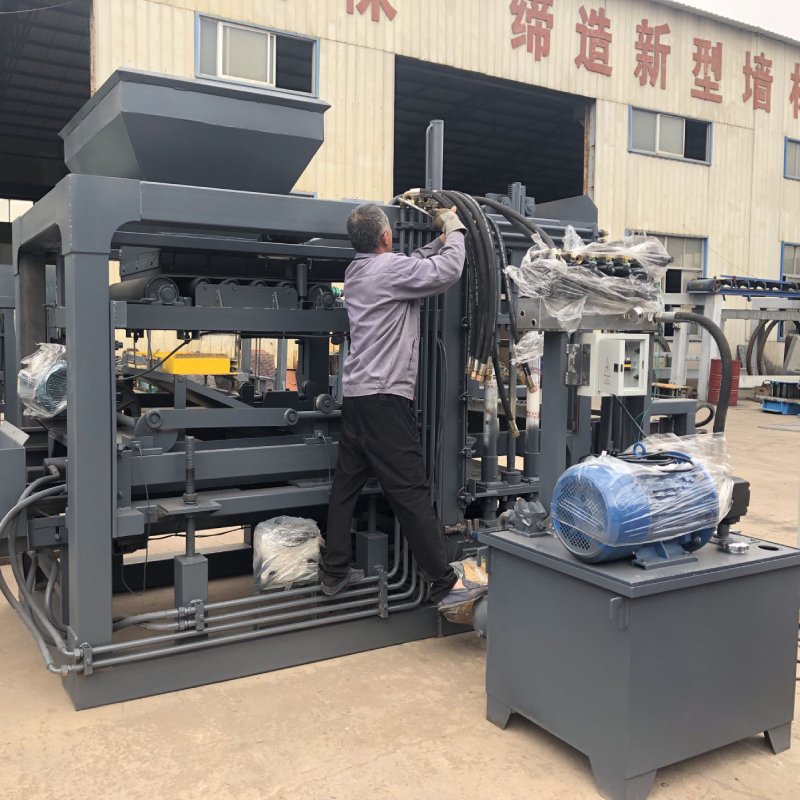
Image source :Aiweiblockmachine
Title: Streamlining Production: Implementing Just-in-Time Inventory Practices for Efficient Block Manufacturing
Introduction
In the dynamic landscape of manufacturing, efficiency is paramount. One strategy that has gained significant traction in recent years is the implementation of Just-in-Time (JIT) inventory practices. This approach, initially popularized by the automotive industry, is now making waves in various sectors, including block manufacturing. In this article, we will explore the concept of Just-in-Time inventory, its principles, and how it can be effectively applied to optimize the production processes in the block manufacturing industry.
Understanding Just-in-Time Inventory Practices
Just-in-Time inventory is a production strategy that aims to minimize inventory levels and associated carrying costs while meeting customer demand precisely when required. The fundamental principle is to produce items at the exact time they are needed in the production process, eliminating excess inventory and associated waste.
Key Principles of Just-in-Time Inventory:
- Demand-Driven Production: JIT relies on a pull system where production is triggered by actual customer demand. This contrasts with traditional push systems, where items are produced based on forecasts and stocked in anticipation of future demand.
- Continuous Flow of Production: JIT emphasizes a continuous and smooth flow of materials through the production process. This minimizes bottlenecks and reduces the need for excessive storage space.
- Elimination of Waste: JIT aims to eliminate various forms of waste, including excess inventory, overproduction, and waiting times. By focusing on efficiency, resources are utilized optimally, contributing to cost reduction.
- Flexibility and Adaptability: JIT encourages flexibility in production processes to quickly respond to changes in customer demand. This adaptability allows manufacturers to efficiently adjust production schedules and product mix.
Implementing JIT in Block Manufacturing
The application of Just-in-Time inventory practices in block manufacturing requires a comprehensive understanding of the production processes, close collaboration with suppliers, and the adoption of lean principles. Here’s how JIT can be effectively implemented in the context of block manufacturing:
- Demand Forecasting and Customer Relations: Accurate demand forecasting is critical in JIT implementation. Establishing strong communication channels with customers helps gather real-time data on demand fluctuations, enabling manufacturers to adjust production schedules accordingly.
- Supplier Collaboration: JIT extends beyond the manufacturing facility to include suppliers. Collaborating closely with suppliers ensures a steady and timely supply of raw materials, minimizing the need for extensive on-site storage. Developing strong, reliable partnerships with suppliers is essential for JIT success.
- Lean Manufacturing Principles: JIT is closely aligned with lean manufacturing principles, which emphasize the elimination of waste and continuous improvement. Applying lean techniques such as 5S (Sort, Set in order, Shine, Standardize, Sustain), Kanban systems, and Total Productive Maintenance (TPM) complements JIT strategies in achieving operational excellence.
- Flexible Production Systems: Implementing JIT requires a shift towards more flexible production systems. This involves reducing setup times, investing in versatile machinery, and adopting modular production methods that allow for quick changes in production volume and product types.
- Employee Training and Engagement: The successful implementation of JIT relies on a well-trained and engaged workforce. Training employees to understand the principles of JIT and involving them in continuous improvement processes contribute to a culture of efficiency and adaptability.
Benefits of Just-in-Time Inventory Practices in Block Manufacturing
The adoption of JIT inventory practices in block manufacturing offers a multitude of benefits:
- Reduced Inventory Costs: By producing only what is immediately needed, excess inventory costs are significantly reduced. This includes expenses related to storage, insurance, and the risk of obsolescence.
- Improved Cash Flow: With lower inventory levels, capital tied up in stock is minimized. This enhances cash flow, providing manufacturers with the financial flexibility to invest in other areas of the business or respond to market opportunities.
- Enhanced Efficiency and Productivity: JIT focuses on streamlining production processes, leading to increased efficiency and productivity. Reduced setup times, optimized workflows, and minimized downtime contribute to a more agile and responsive manufacturing environment.
- Higher Quality Products: JIT emphasizes the identification and elimination of defects early in the production process. This commitment to quality results in higher-quality products reaching customers, reducing the likelihood of costly rework or recalls.
- Shorter Lead Times and Faster Response to Market Changes: JIT allows manufacturers to respond quickly to changes in customer demand or market conditions. Shorter lead times enable a more agile response, ensuring that production aligns closely with real-time demand.
Challenges and Considerations
While the benefits of JIT implementation are substantial, challenges must be navigated to ensure success:
- Supply Chain Vulnerabilities: JIT relies on a well-coordinated and reliable supply chain. Disruptions, such as delays in raw material delivery or supplier issues, can have a significant impact. Building resilience and contingency plans are essential to mitigate these risks.
- Initial Implementation Costs: Shifting to a JIT system may require upfront investments in technology, employee training, and process reengineering. Manufacturers need to carefully assess and plan for these initial costs to ensure a smooth transition.
- Cultural Shift: Implementing JIT often involves a cultural shift within the organization. Employees may need time to adapt to new ways of working and thinking. Leadership support and effective change management strategies are crucial for overcoming resistance and fostering a culture of continuous improvement.
Future Trends and Conclusion
The future of block manufacturing is likely to see an increased emphasis on technology-driven solutions to further enhance the effectiveness of JIT practices. The integration of data analytics, Internet of Things (IoT) sensors, and artificial intelligence will provide manufacturers with real-time insights into production processes, demand patterns, and potential areas for improvement.
In conclusion, the implementation of Just-in-Time inventory practices in block manufacturing represents a strategic move towards efficiency, cost reduction, and responsiveness to customer demand. By embracing the principles of JIT and leveraging technological advancements, block manufacturers can position themselves for sustained success in an increasingly competitive market. As the industry continues to evolve, the principles of JIT will remain a guiding force, driving continuous improvement and innovation in the quest for operational excellence.
